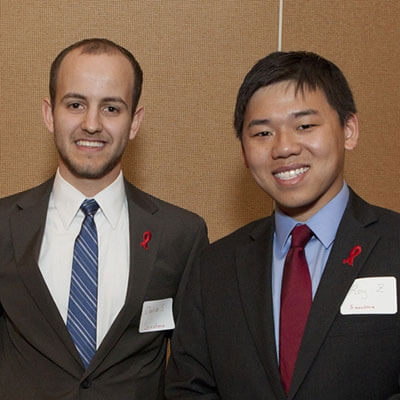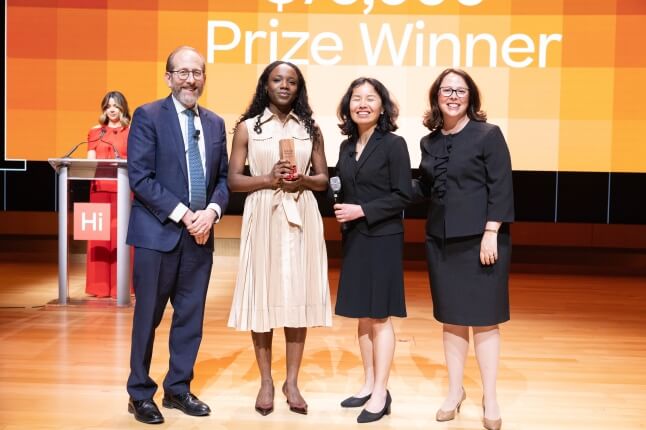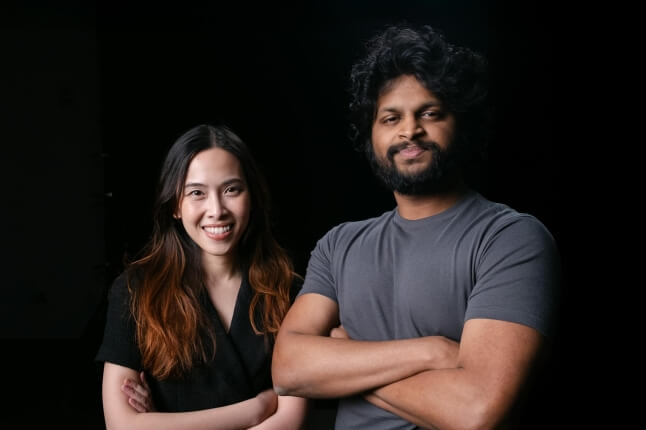News
Dario Sava '13 (left) and Roy Zhang '13 (right) helped launch Sawubona Health, a non-profit that helps health clinics stay in touch with HIV patients who are at risk of stopping their medications. The project won the Senior Social Startup Prize at the 2013 Harvard College Innovation Challenge and is now a finalist in the Harvard President's Challenge. (File photo by Eliza Grinnell, SEAS Communications.)
On a recent Wednesday evening, four floors above Mt. Auburn Street in what is known as the “i-space,” a group of five Harvard students had claimed one small, stuffy office room to discuss the impending launch of their startup. Laptops open, bullet points scrawled on a whiteboard opposite a Rosie the Riveter poster, the group shifted easily between brainstorming and casual jokes.
“We need to think about the timeline,” said Brandon G. Gerberich ’14, regarding the April 11 launch of Padibility, a roommate matching and housing referral service that has so far garnered 138 “likes” on Facebook. “Quick manual feedback is going to be very tough.” Gerberich is technically the team’s chief data science officer, but in a small team, anyone can and does chime in.
“How GIF-based do we want the survey to be?” Timothy S. Hopper ’14 asked.
“We have to make sure we’re getting important info,” countered Angie Peng ’14.
“They could be a reflection of personality,” said Naji A. Filali ’14. “Conflict resolution, personal values.”
“Right,” Hopper said, speculatively: “If they like the same kind of GIF they might be the same kind of person.”
All the group’s members are currently enrolled in ES95r: “Startup R & D,” taught by lecturer Paul B. Bottino, who is also the executive director of Technology and Entrepreneurship Center at Harvard. Students interested in the course must form a team, present their project, and respond to questions, before being selected for an intensive, field-based class meant to assist in developing ideas and planning implementation.
“Taking Paul Bottino’s class is just huge,” said Yohei Oka ’14. This year, Oka, Paul Koullick ’14, and Eduardo Lopez Beeche ’14 founded OFORO, an organization that works with healthcare non-profit Partners in Health to donate one condom in Malawi for each condom sold. “You get to spend all the time you’d normally spend in a class working on your ideas.”
ES95r is just one example of an increasing number of courses, spaces, and resources for students interested in entrepreneurship at Harvard. David A. Edwards teaches ES20: “How to Create Things & Have Them Matter,” while Business School professors Mihir A. Desai and David L. Ager taught the second iteration of a popular United States in the World class, “Innovation and Entrepreneurship: American Experience in Comparative Perspective” last fall. The TECH space in the Square takes its place next to the Harvard Innovation Lab, or i-Lab, across the Charles River, founded in November 2011. And multiple University-based challenges offer competition and funding to select startups, including the i3 challenge that dispensed $50,000 in funding to finalists last week. Why the recent upsurge in interest? “Partially because of Mark Zuckerberg,” Oka speculated, “and these big, shiny, new deals.”
“Everyone and his grandmother is working on some sort of startup,” wrote Jacob R. Drucker ’15 in a Crimson op-ed last week. But students, increasingly, are finding that they can pursue fame and fortune, or at least a cool idea, without having to follow the Facebook founder in dropping out of school. And Harvard, increasingly, seems invested in keeping them here.
Read the entire article in the Harvard Crimson
Topics: Entrepreneurship
Cutting-edge science delivered direct to your inbox.
Join the Harvard SEAS mailing list.



